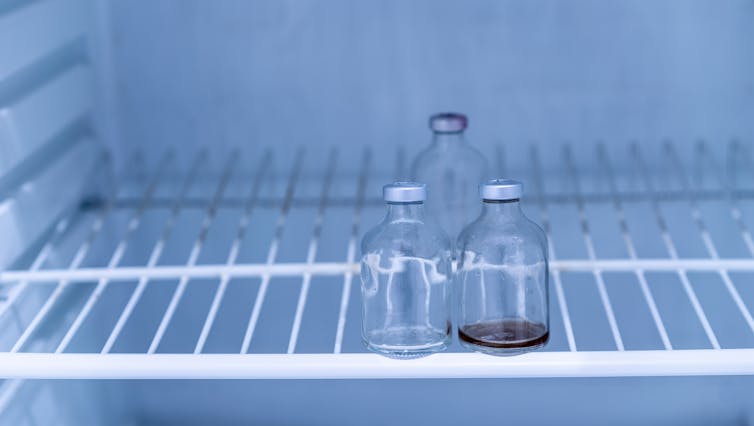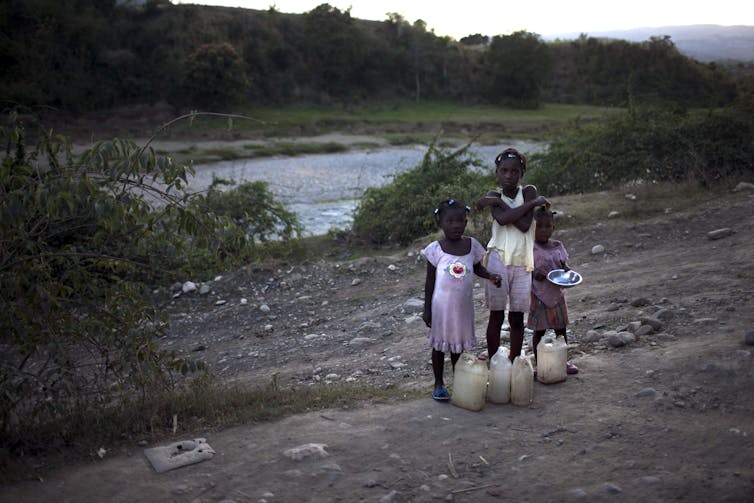Timothy Ford, University of Massachusetts Lowell and Charles M. Schweik, University of Massachusetts Amherst
To mitigate health inequities and promote social justice, coronavirus vaccines need to get to underserved populations and hard-to-reach communities.

There are few places in the U.S. that are unreachable by road, but other factors – many rural hospitals can’t afford ultralow-temperature freezers or might not have reliable electricity, for example – present challenges. However, with government will and resources, these could be overcome.
That is not true for much of the rest of the world.
One of us, Tim Ford, is a global health researcher who has done a lot of international work on water and health where the cold supply chain cannot go, most recently in rural Haiti. The other, Charles Schweik, studies how the spread of innovations – both digital and physical – can solve pressing societal problems and social inequities.
The Pfizer and Moderna vaccines are a great start that should be celebrated, but they rely on a complicated supply chain of freezers and temperature-controlled shipping methods called the “cold chain.” That reliance on the cold chain raises equity and social justice concerns, since many parts of the world cannot support one. Researchers are working hard on vaccines that can avoid the logistical and economic nightmare of cold chain delivery.

Where the cold chain doesn’t go
In poorer areas, more remote parts of the world and in places where the mean daytime temperature is high and electricity is unavailable or spotty, there are no mechanisms to keep vaccines at low temperatures. There may in fact be no roads – let alone airports – in many of these places either. And even if roads exist, they may be impassable at certain times of the year or inaccessible for political reasons or because of civil unrest.
Both the Moderna and Pfizer vaccines need to be kept frozen and must rely on the cold chain to get anywhere. Only large wealthy countries have the resources to implement a well-developed cold chain, and that means huge parts of the world currently can’t get a COVID-19 vaccine.
This is bad for public health and fails to be equitable and just.

Temperature-stable vaccines
Vaccines are coming that do not require ultralow-temperature storage. Some companies, including AstraZeneca and Johnson & Johnson, are working on vaccines that need only refrigeration as opposed to storage at freezer temperatures. In late December, the AstraZeneca vaccine was authorized for use in the U.K.. Both vaccines should be available to the global market the next couple of months and could greatly expand vaccine reach.
Both companies are also working with the COVAX Facility, which describes itself as “a global risk-sharing mechanism for pooled procurement and equitable distribution of eventual COVID-19 vaccines.” The goal is to make vaccines available to all countries participating in the COVAX program, regardless of income levels. As of mid–December, 92 low- and middle-income countries have signed up.
Refrigeration is better than freezing, but for remote locations, room temperature is best, and researchers are working on thermostable COVID-19 vaccines that won’t need refrigeration. Techniques that remove the need for a vaccine cold chain have been used for many decades with success. Freeze-dried vaccines are one such example. The first thermostable vaccine was developed for smallpox in 1955 and is credited in part with the ultimate elimination of the disease.
Today, researchers continue to look for innovative ways to stabilize viral vaccines: from air-drying with low-cost sugar films to freeze-drying with different stabilizing agents. Some researchers are also working on stable liquid formulations, in particular live attenuated flu viruses, that avoid the costly process of freeze-drying, which is not always easy for low- and middle-income countries to do. All these approaches could be applicable to live virus vaccines that use an attenuated virus, just like the flu vaccine, as well as both of the coronavirus vaccines under development by AstraZeneca and Johnson & Johnson.
Hope for COVID-19 vaccines?
So far, this is mostly basic research, but progress in this area would greatly help meet global health needs.
To date, the most promising efforts toward temperature-stable COVID-19 vaccines come from groups in China and India. Chinese scientists have developed a method to wrap an mRNA vaccine in lipid nanoparticles that keep it fresh at room temperatures. Indian researchers are using an engineered protein fragment that is tolerant of high temperatures. Most recently, a U.K. team has begun collaborating on a polymer-stabilized, needle-free, solid-dose vaccine.
Given the limitations of the cold chain, there are public health, moral and ethical obligations that require investment in vaccines that can be delivered using non-cold-chain approaches. For people in many places, that is the only way they will ever get a vaccine.
Timothy Ford, Professor and Chair of Biomedical and Nutritional Sciences, University of Massachusetts Lowell and Charles M. Schweik, Professor of Environmental Conservation, University of Massachusetts Amherst
This article is republished from The Conversation under a Creative Commons license. Read the original article.












